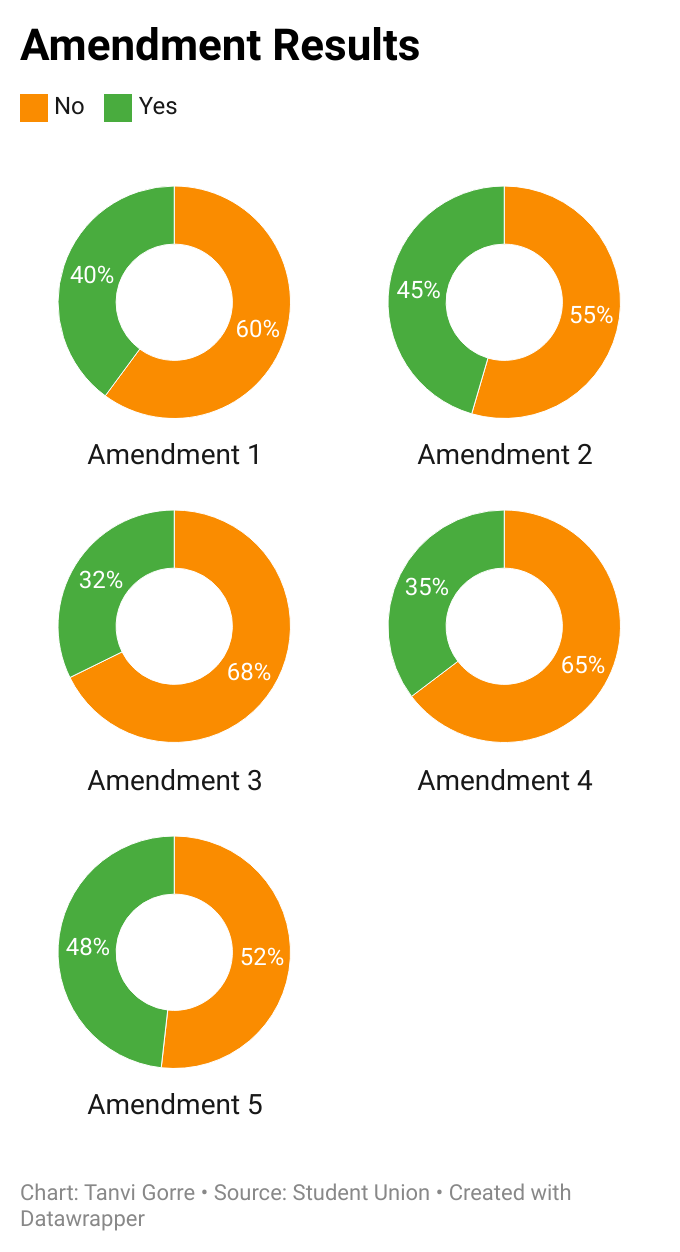News
Student Union constitutional changes fail in special election

Results from this week’s special election (Tanvi Gorre | Student Life)
All five of the proposed amendments to the Student Union (SU) constitution failed in a special election held from April 15 to April 16. The changes, which were voted on by 6.1% of the student body, would have established a new Executive Council role, the Attorney General, and opened the door to compensating SU members who are Pell-eligible and/or work-study eligible.
The new Attorney General, as outlined in the proposed constitutional change, would have focused on investigating the constitutionality of SU’s actions.
According to Constitutional Task Force member and senior Ben Ewer, this role would have also acted as an SU constitution and legal advisor for the Executive Council, Senate, and Treasury.
“Not everybody reads the Constitution and knows everything they have to do,” Ewer said.
Constitutional procedures and policies both can and have been violated without SU members being aware of them. For instance, the resolutions passed by Senate last year were never ratified by SU’s president, even though it is part of constitutional procedure. The Attorney General would have filled this gap and initiated intervention in the event of unconstitutional actions taken by SU in this instance. Further, this role would have acted as a legal advisor to the Executive Council, Senate, and Treasury to provide any guidance on SU legal matters.
However, some voters felt the Attorney General’s role was uncalled for. In a Sidechat post which garnered 105 upvotes, an anonymous user questioned, “Who thinks they need an Attorney General[?] [C]alm down”.
In this special election, SU also put forward an amendment opening the door for Pell-eligible and work-study eligible students to be compensated for their work at SU. This amendment, which was voted against by 64.69% of voters, paralleled a similar constitutional proposal that failed last year.
When a joint session of Treasury and Senate discussed the new constitutional changes last Tuesday, this amendment became a point of contention. SU President and junior Ashton Lee hoped the change would help SU better represent its constituents.
“SU should not be this ivory tower where decisions are made by students that aren’t representative of the whole student body,” Lee wrote. “This should only be the beginning of welcoming historically disenfranchised communities to the decision-making table.”
Some SU representatives, on the other hand, felt the change would incentivize students to join SU for the sake of getting paid instead of advocating for their constituents.
However, not all amendments proposed in this election would have had an immediate impact on SU operations. Several of the amendments were set to constitutionalize pre-existing roles and procedures in SU to ensure that they are passed down to future SU bodies. These amendments mainly include ratifying unofficial procedures in the Executive Council, Senate, and Treasury in SU’s constitution.
Although the amendments failed, some SU members will continue to fulfill these unofficial duties. Executive Vice President and first-year Asher Lubin said he is excited to work on training new SU members, a responsibility that failed in this past election.
“Over the summer, I am planning to convene a meeting with [Executive Council], and the speakers from the respective branches, to develop a universal training system for SU-wide understanding,” Lubin wrote in a statement to Student Life.
The special election sparked a range of discourse on Sidechat. After the amendments failed, an anonymous user took to Sidechat and posted “hell yeah #f*ckSU” which was upvoted 552 times as of the time of publication; according to Student Life calculations, approximately 440 students voted in the election.
Vice President of Finance and junior Meris Damjanovic felt the constitutional changes proposed in this election would have had a positive impact on SU.
“I think the changes made during the Constitutional Task Force [would] make my role, and all other positions and entities run much smoother,” Damjanovic wrote. “I was on the task force and approved every change to my role alongside the other members and believe all changes are for the betterment of SU and the student body.”
Ewer echoed Damjanovic’s sentiment and felt the impacts of the changes were not communicated to the student body at the time of the election.
“It’d be nice to have the students be a little more charitable to SU, but at the same time, SU has to do a better job and earn some of that trust back,” Ewer said. “I wish that we had been able to convey to students that these changes were an effort towards that end, and not a way of taking things away from them.”
